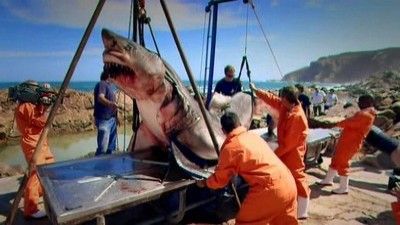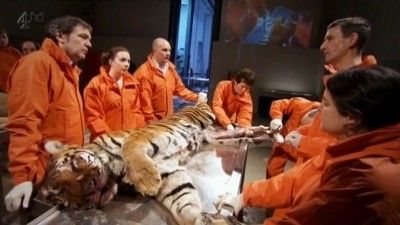The WORST episodes of Inside Nature's Giants
Every episode of Inside Nature's Giants ever, ranked from worst to best by thousands of votes from fans of the show. The worst episodes of Inside Nature's Giants!
Inside Nature's Giants will delve under the skin of the world's largest animals to reveal their unique anatomy and unravel their evolutionary secrets. Most wildlife documentaries show you how animals behave, but by exploring inside nature's giants we emerge with a deeper understanding of how these animals work. We will discover how elephants are able to consume so much food; why crocodiles have such an incredibly strong bite; why giraffes have such a long neck and why the closest living relative of the whale is a hippo. This is Natural History as you have never seen it before - from the inside out.
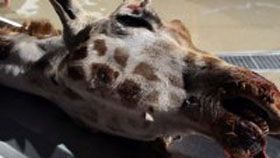
#1 - The Giraffe
Season 1 - Episode 4 - Aired 7/20/2009
Veterinary scientist Mark Evans acts as guide as a team of experts investigate the giraffe. Creationists question how this extraordinary creature could have evolved such a long neck, but for evolutionary biologist Professor Richard Dawkins the anatomy of the world's tallest animal provides some of the best arguments in favour of Darwinian natural selection. For example, one nerve takes a huge detour up and down the long neck, from the voice box to the brain, via the chest - hardly the work of an `Intelligent Designer'. And, despite its length, the neck still only has seven vertebrae - the same number as almost all mammals, from mice to humans and whales. But it's no wonder the giraffe has the highest blood pressure of any animal; with a heart not much bigger than our own it must pump blood at high pressure around a towering body. It has evolved thick skin that acts as a natural 'G-suit' and a complex circulation system to avoid passing out when raising and lowering its head. And as the dissection team piece together the remarkable evolutionary story of the giraffe, biologist Simon Watt observes them in the field as they eat, forage and fight.
Watch Now:Amazon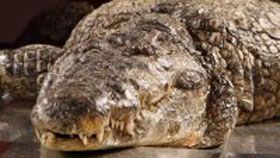
#2 - The Crocodile
Season 1 - Episode 3 - Aired 7/13/2009
Veterinary scientist Mark Evans joins experts in anatomy, evolution and behaviour in a bid to get under the skin of the crocodile. Meanwhile evolutionary biologist Professor Richard Dawkins explains how little the crocodile has changed since the age of the dinosaurs. The team uncovers the crocodile's incredible jaw muscles, as biologist Simon Watt travels to Florida to test the huge strength of the massive reptile's bite: the most powerful in the animal kingdom. But while crocodiles' spiked teeth are excellent for gripping prey as they plunge into a death roll, they are useless for chewing. So how do these animals manage to digest large chunks of raw meat and bone? As the experts dissect the digestive system and inspect the stomach contents for clues, they reveal the bizarre plumbing between the heart and the stomach that might provide the key to this puzzle. And they also solve the mystery of this crocodile's premature death.
Watch Now:Amazon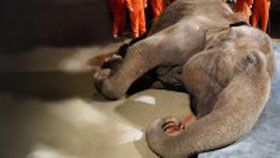
#3 - The Elephant
Season 1 - Episode 1 - Aired 6/29/2009
This programme looks at how evolution has overcome the challenges of being as big as an elephant. Elephants feed on plants with very little nutritional value for 18 hours a day, so evolution has given them vast intestines as well as huge teeth and jaw muscles - and an equally gigantic head. But this produces another problem: how to reach food on the ground. The solution is the most versatile limb on the planet - the trunk. Capable of everything from picking up berries to ripping a tree from the ground, the trunk is a wonder of evolution. It's a Just So Story for the Darwinian age.
Watch Now:Amazon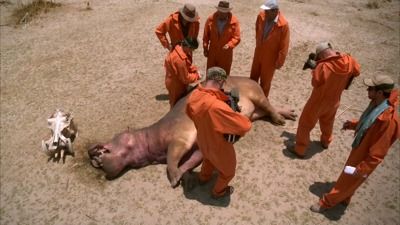
#4 - The Hippo
Season 4 - Episode 1 - Aired 4/9/2012
So many hippos congregate to feed in Zambia's Luangwa Valley that they threaten the survival of other species in the park, so the authorities cull around 200 of them every year. The cull offers veterinary scientist Mark Evans and comparative anatomist Joy Reidenberg the opportunity to dissect one of these magnificent animals.
Watch Now:Amazon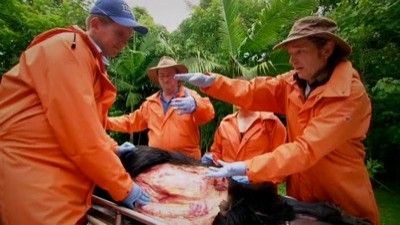
#5 - The Dinosaur Bird
Season 3 - Episode 2 - Aired 9/6/2011
The BAFTA-winning series returns to Australia on the trail of a bird that's been described as a living dinosaur and hides in Queensland's tropical rainforests: the Cassowary. The Cassowary is a gigantic bird with a fearsome reputation. It can be taller and heavier than a full-grown man and is armed with five-inch talons that have actually killed humans
Watch Now:Amazon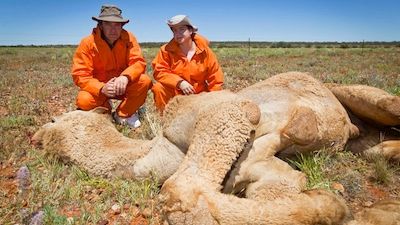
#7 - The Camel
Season 3 - Episode 1 - Aired 8/30/2011
The BAFTA-winning Inside Nature's Giants team returns for a new series, heading deep into the Australian Outback to explore the ultimate desert survivor: the camel. We don't think of Australia as the home of camels, but in the middle of this vast island there are over a million feral dromedaries roaming around. European settlers introduced them over a century ago to help build Australia's railways and explore the Outback. But with the advent of roads, cars and trucks, camels were no longer needed, so their owners released them into the desert. Mark Evans and Joy Reidenberg brave the baking desert to dissect a camel. They uncover the secret of the camel's hump and investigate how its elastic legs, stretchy lips and pedestal are among the many surprising adaptations that enable the camel to thrive in such a dry and hostile environment.
Watch Now:Amazon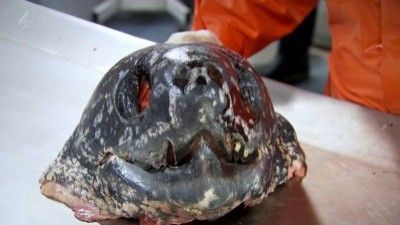
#8 - The Leatherback Turtle
Season 3 - Episode 3 - Aired 9/13/2011
The team travel to Florida to dissect the ocean's largest reptile - the leatherback turtle. They uncover the evolutionary mystery of how turtles developed shells to protect themselves from some of the sharpest-toothed predators on the planet. 2
Watch Now:Amazon
#10 - The Kangaroo
Season 4 - Episode 2 - Aired 4/16/2012
Mark Evans and Joy Reidenberg head to Australia to dissect its most iconic animal, and find the marsupials' reproductive organs to be most surprising - the male genitalia is back to front, while the female has three vaginas. Simon Watt heads into the Blue Mountains with Charles Darwin's great-great-grandson in search of other creatures, including a bird that decorates its nest with an assortment of blue ornaments and a primitive mammal that lays eggs like a reptile.
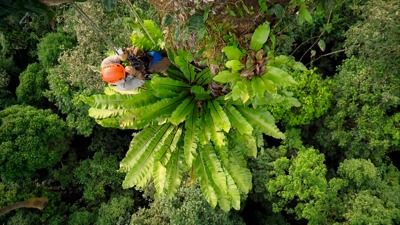
#11 - The Jungle
Season 4 - Episode 3 - Aired 4/23/2012
The team take on their hardest challenge so far, to dissect an entire ecosystem - the jungle. Deep in the rainforest of Borneo they erect a high-tech dissection laboratory to investigate giant bugs and titan trees, and to reveal why the jungle is home to the most diverse collection of living things on our planet. With a team of all-star biologists, anatomists and tree climbers, they delve into the mysteries of the rainforest: how it fits together and the extraordinary roles the strange creatures that live in it play; how waterfalls flow uphill, life springs from death and parasites hold the key to holding the jungle in balance. Veterinary scientist Mark Evans climbs 60 metres into the canopy to catch the world's largest ants; comparative anatomist Joy Reidenberg heads deep into the forest to catch venomous centipedes and giant moths; and biologist Simon Watt investigates the most sinister organism of them all - an enormous parasitic fig tree.
Watch Now:Amazon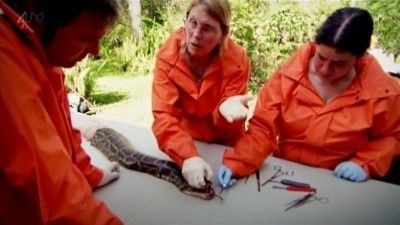
#12 - The Monster Python
Season 2 - Episode 2 - Aired 6/15/2010
The experts venture into the swamps of the Florida Everglades, where giant Burmese pythons are thriving. The programme explores the science of slithering, how snakes have developed 'infra-red goggles', which allow them to hunt warm-blooded prey in the dark, and how a flexible jaw allows pythons to stretch their mouths around huge prey, including alligators.
Watch Now:Amazon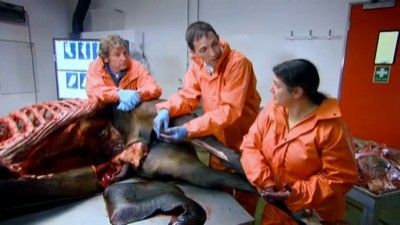
#13 - The Racehorse
Season 3 - Episode 4 - Aired 9/20/2011
The thoroughbred racehorse is one of the greatest athletes on the planet, galloping with incredible speed and stamina for such a large animal. It is the result of unnatural selection, and exists on a knife edge between glory and catastrophic failure. The team explore how this animal has been biologically engineered for speed. They dissect an elite racehorse to reveal the extraordinary spring system that propels it to 45mph, its super-sized organs and built-in turbo-booster. Simon Watt visits the top breeding centre in Europe to find out how to produce a champion; and Mark Evans investigates the science behind their phenomenal performance and their vulnerability to injury
Watch Now:Amazon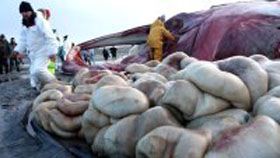
#14 - The Whale
Season 1 - Episode 2 - Aired 7/6/2009
In this episode experts dissect a 65-foot, 60-ton fin whale - second only in size to its 'cousin' the blue whale - that has died after being stranded off the coast of Ireland. It's a race against time as whale anatomist Joy Reidenberg flies in from New York before the animal's decomposition causes it to explode on the beach. Veterinary scientist Mark Evans helps investigate why the animal died and explores its extraordinary anatomy. Using whale-size machinery, Joy and the team set to work amidst gale force winds, driving rain, blood, intestines, evil smells and freezing conditions. Meanwhile, advancing tides threaten to engulf the whale, as the team struggles to complete the operation. Beneath the blubber, the whale's unique anatomy holds vital clues to its evolution. Using a combination of dissection and computer graphics, the programme discovers an animal whose closest living relative is the hippo. Meanwhile, evolutionary biologist Richard Dawkins explains why the whale's ancestors may have taken to the water and the evolutionary problems that had to be overcome to transform a land-based mammal into an animal that swims among fish.
Watch Now:Amazon